Hotel California is basically a negative Yelp review with a two-minute guitar solo.
In today’s world, what people say about a hotel online can really affect its success. Whether it’s a glowing review or a critical comment, these opinions shape how other travelers see the hotel. That’s where hotel reputation management comes in. It’s all about paying attention to what guests are saying online and using that information to make the hotel even better.
In this article, we’ll explore how hotels can maintain a good name, discuss the key operational strategies, and look at software tools that support them.
What is reputation management in a hotel?
Reputation management in hospitality refers to the practices and strategies properties use to monitor, influence, and improve how they are perceived by guests and the public.
The reputation management process involves keeping a close eye on reviews, feedback, and comments across various platforms, such as online review sites, social media, and direct customer feedback channels (e.g., surveys). It also includes actively engaging with customers by responding to their reviews, addressing their concerns, and highlighting positive experiences to build a favorable public image.
In simple words, reputation management is about making sure the good stuff people say about your business outweighs the not-so-good stuff.
Online reputation management: the role of social media and review platforms
A big part of a hotel's reputation today lives online. People leave – and read – reviews on web platforms, the most significant of which are
- TripAdvisor,
- Google,
- Expedia,
- Booking.com, and
- Yelp.
And while you’re certainly aware, it’s worth a mention that social media sites like Facebook also play a huge role.
What people write on these platforms can influence others who are deciding where to stay. For example, TripAdvisor users generally read 9 reviews before making up their minds about a place.
Why is reputation management important?
Take care of your reputation. It’s your most valuable asset.
Reputation management is crucial for several reasons.
Influence on booking decisions. Most travelers today rely on online reviews and ratings when deciding where to stay. In fact, TripAdvisor’s The Power of Reviews research states that 82 percent of respondents said that reviews are important in accommodation choice. Another TripAdvisor study found that 79 percent of people would select a hotel with a higher rating if they had a choice.
So a strong reputation can significantly influence guest decisions, leading to increased bookings and revenue.
Competitive advantage. In a highly competitive industry, a good reputation can set a business apart from its rivals, making it the preferred choice for travelers.
Customer trust and loyalty. By actively managing their reputation, businesses can build trust with their customers. A responsive and caring approach to feedback can turn even dissatisfied guests into loyal ones. And loyal customers often become brand ambassadors, bringing more business to your company.
Feedback loop for improvement. Reviews and feedback provide valuable insights into what a business is doing right and where it can be better. This information can guide operational, service, and product improvements.
Impact on revenue. Ultimately, the hospitality business’ reputation directly impacts its bottom line. A positive reputation leads to higher occupancy rates for hotels, which is one of the key factors of financial success. Also, studies prove that hotels with a higher rating and a bigger number of reviews have a higher value of transaction per customer, which in turn leads to increased revenue.
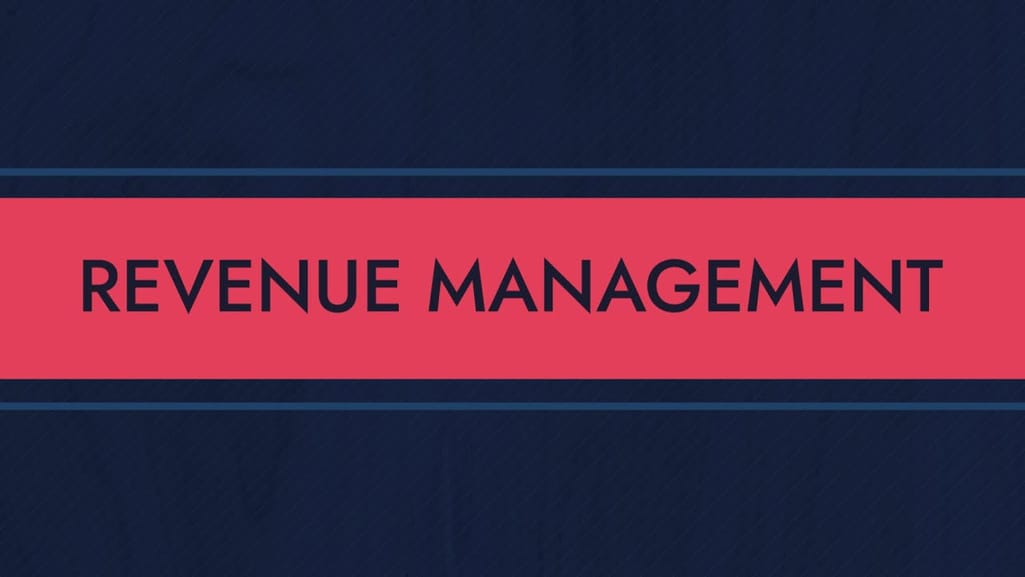

Revenue management in hospitality explained
So now let’s talk about what hotels can actually do to manage their status.
Reputation management strategies
Managing a hotel's reputation effectively requires a blend of proactive engagement, responsive communication, and consistent service excellence. Here are key strategies that hotels can employ to maintain and enhance their reputation.
Encourage positive reviews
Besides providing your guests with the reasons for excellent reviews – which kind of goes without saying – politely encourage them to share their experiences online. The best time for such a gentle reminder is after a positive interaction or at checkout.
Also, make it easy for people to leave reviews, for example, by putting a QR code near the front desk or providing a link in a follow-up email to direct guests to review sites. Consider offering incentives for leaving a review like a discount or free breakfast during a future stay.

An example of a review request
Pro tip: You can also send out mid-stay emails asking travelers to provide their feedback directly to the hotel before posting online. This can help identify and resolve issues before they result in negative online reviews.
Monitor online reviews and social media
Make sure you register your property on popular review sites like TripAdvisor, Yelp, and Google Maps. Actively monitor feedback there, as well as OTA websites you’re listed on and social media channels.
Reputation management software can help track mentions and reviews across multiple platforms. We’ll discuss how these tools work in one of the next sections.
Pro tip: A good idea is to set up alerts to stay immediately updated on new reviews. Check out Google Alerts as an example of this handy functionality.
Respond to reviews promptly and professionally
Sitejabber survey shows that 80 percent of consumers expect a review response within 2 weeks – and 72 percent of them expect it within days, at most a week. If you’re a big company getting many reviews daily, you probably can’t respond to each one. But if you run a smaller property and your reputation isn’t developed yet, do your best to react to as many reviews as possible.
And that means any kind of review. Acknowledge positive feedback by thanking guests for their stay and taking the time to leave a nice review.

An example of responding to a positive review
Though receiving negative feedback can be frustrating, you must address it as well. We’ll dedicate the next section to discussing how to work with negative reviews in detail.
Pro tip: When responding to reviews, avoid copying-pasting standard replies. Using templates for various situations will definitely save time, but be sure to tailor responses to the specifics of each review whenever possible to show that you value guest feedback. At least mention the guest’s name in your reply. Also, a good practice is inviting the reviewer to come back again.

Read more about personalization in hospitality in our dedicated article.
Manage your online presence across channels and leverage social media
Managing your online presence is a big topic in itself that involves multiple strategies for effective reputation management. Here, we’ll just briefly outline the key points.
Ensure information is updated and consistent. Keep information about your property up to date and maintain consistency across online channels. Ensure that your hotel’s profile on review sites and your own website accurately reflects your offerings.
Showcase your strengths. Post text and media content about the hotel’s amenities, rooms, unique experiences, sustainability efforts, local culture, and cuisine—anything that can add to its appeal. Today, people especially love learning about a business through video content, so you can film your activities, facilities, a behind-the-scene look of the restaurant – the sky's the limit to creativity.
It’s also important to share positive reviews and testimonials from other travelers. Use your website, social media, and marketing materials to highlight positive guest experiences.
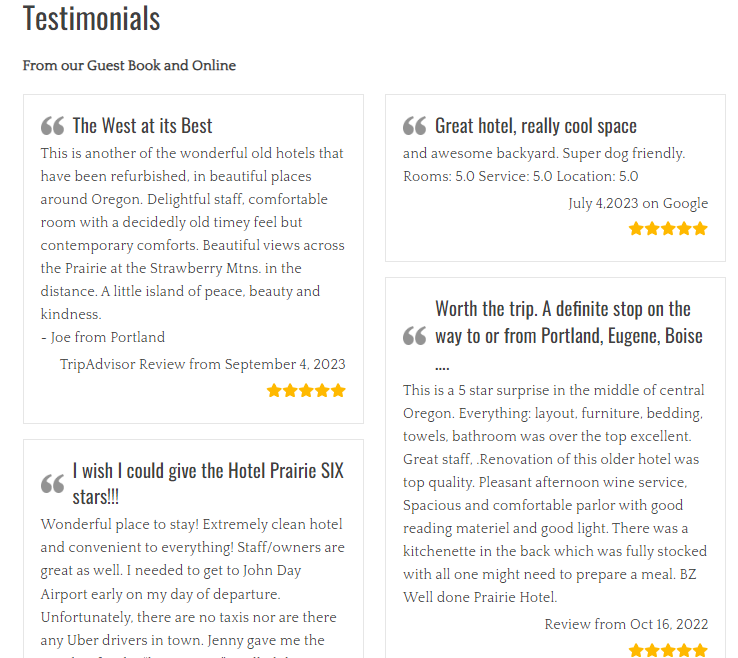
At the same time, be open about mistakes. If something goes wrong, be honest about it, apologize, and explain how you’re going to fix it. And if you’ve made improvements based on feedback, let your guests know through social media or email newsletters.
Encourage open communication. Make it easy for guests to provide feedback both directly to you and via public platforms – and make sure to respond to comments and messages. That will show that you’re listening and care about your guests’ experiences.
Be active. Engaging with your guests on social media is a highly effective marketing strategy. Share updates, special offers, and behind-the-scenes content to create a connection with your audience. This way, you’ll make your guests feel special and build a friendly and positive brand image.
Pro tip: Reviews are a crucial part of so-called “earned media,” but they are not the only ones. Earned media is any external content that’s not generated or paid for by you. That includes mentioning your business in the news, blogs, other users’ social media pages, etc. Remember to monitor these mentions as well.
As you manage your online reputation, remember that all experiences during the guest's stay matter. So, whenever possible, go above and beyond to deliver exceptional service and create memorable experiences that guests will want to share.
How to handle negative reviews
Working with negative reviews is a crucial aspect of reputation management for any business, especially in the hospitality industry. Handling negative feedback effectively can turn potentially damaging situations into opportunities for improvement and demonstrate your commitment to guest satisfaction.
As we said, it’s important to monitor and react to reviews as quickly as possible, showing that you take guest feedback seriously. The critical role of reviews in Internet trust study states that 64 percent of consumers would prefer to buy from a responsive company over one that appears perfect.
Acknowledge and apologize. Start your response by acknowledging the guest’s complaint. It shows you’re listening and that you care. Regardless of the specifics, apologize for the fact that the guest had a less-than-ideal experience. It's not about admitting fault; it's about expressing empathy.
When crafting your response, remember the difference between “I’m sorry” and “I apologize.” The former is a sign of empathy, while the latter means you take responsibility for something that was your fault.

Mention that you work on the issue. Once you acknowledge the guest's experience, explain any measures being taken to address their concerns. This approach demonstrates a commitment to guest satisfaction and can positively influence potential guests reading the reviews.
Provide an explanation, if appropriate. If there’s a specific reason for the issue (like renovations or an unusual circumstance), explain it briefly. This can help mitigate frustration and demonstrate transparency. But ensure your explanation doesn’t come off as making excuses. Again, the focus should be on empathy and understanding.
Offer an incentive. This one is optional, but it may be a good way to decrease tension, especially if the issue described in the review was your fault. You can offer a discount, a spa coupon, a complimentary bottle of wine, or any other appropriate perk on the next stay.
Take the conversation offline. Handling the situation offline prevents the issue from escalating publicly and allows for a more personalized approach to resolution. So offer to discuss the issue further and provide a direct contact method (phone number or email). This shows you're willing to address the guest's concerns personally.

Take action and follow up. If the review highlights a recurring problem, take steps to address the underlying issue to prevent future complaints. After resolving the issue, consider reaching out to the reviewer to inform them of the steps you’ve taken and to invite them back. This can sometimes lead to updated reviews or positive word of mouth.
You can also add a notein your system to a guest’s profile so that when they stay with you again, you’ll be sure to deliver an exceptional experience.
Learn from the feedback. Analyze negative reviews for patterns or recurring issues. This feedback can be invaluable for making operational or service improvements. Discuss the feedback with your team, especially if it pertains to service quality or guest experience, to prevent similar issues from occurring.
Have a plan B. One negative review usually isn’t a problem, but if any kind of severe reputational crisis happens, it’s better to be prepared. Develop contingency plans for possible scenarios, such as an accident involving the guest, data breaches, etc., and make sure everyone knows what to do if an emergency occurs.
You might also want to engage external experts to help you create the right PR strategy, improve your brand’s image, and cope with any reputation breaches. Some recognized consultants are NetReputation, Reputation Defender, or Reputation X (based on reviews from Trustpilot).
Note that what you shouldn’t do is
- ignore bad reviews,
- try to justify the mistake,
- argue with the reviewer,
- place blame on the guest, and
- delete bad reviews.
And one more final piece of advice on the topic: Try to embrace negative reviews. After all, there’s an opinion that a 5-star rating is perceived by customers as fake and “too good to be true.” People want a mix of positive and negative reviews to get a full picture and evaluate the brand’s transparency and responsiveness to criticism.
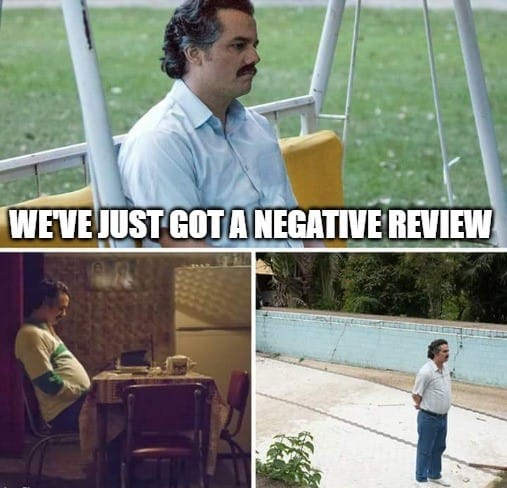
As we said earlier, it’s important to encourage all guests to leave their feedback. A higher volume of reviews can help balance out the occasional negative feedback. And now that you know how to work with online reviews, let’s talk about how technology can make this process more efficient.
Reputation management software for hotels: main features
Today, there’s so much online content that managing everything manually is only possible for small properties. So the role of technology in maintaining a hotel's reputation is growing. Software can automate repetitive tasks and streamline the processes of monitoring, analyzing, and responding to guest feedback across various platforms. And powered with AI, it can be even more helpful. So let’s look at the core capabilities of reputation management tools.
The specific functionality definitely varies across solutions and providers, but we’ll look at the most common features you can expect.
Centralized monitoring and social media listening
Reputation management software can aggregate reviews and mentions from multiple sources, including OTAs, social media platforms, and review websites, into a single dashboard. This makes it easier to monitor what guests are saying across the web.
Social media integration is especially important because it allows you to engage with guests, share positive reviews, and address concerns across social platforms from a single interface.
Software tools can also provide real-time alerts for new reviews, especially negative ones, allowing hoteliers to respond promptly and appropriately.
Analysis and insights
Advanced software today employs machine learning and natural language processing techniques to perform sentiment analysis and categorize reviews as positive, neutral, or negative, helping hotels quickly identify areas needing attention.
Please visit our dedicated post to learn more about sentiment analysis in the hospitality industry.
Also, check out our case study on how we at AltexSoft developed an ML tool to score hotel amenities. Upon user request, the system collects reviews about the property, identifies descriptions of amenities (e.g., bathrooms, lounges, or air conditioning) from reviews, and assesses these reviews for signs of positive, neutral, or negative experiences. Then it combines these findings into a score for each amenity and an overall hotel score. This allows users to quickly see how individual amenities rate and compare hotels without having to read all the reviews.
By analyzing review data over time, reputation management software can help define patterns, trends, and recurring issues, enabling hoteliers to make informed decisions about where improvements are needed.
For example, you might find out that many of your guests don’t like the breakfast assortment, or that Wi-Fi is regularly dropping, or maybe the complimentary toiletries have an unpleasing smell. On the other hand, you might learn that people enjoy the service or the room decorations. The extracted insights will give you another perspective – a picture of how your guests actually see your property.
Response management
To speed up the response process, software can offer customizable templates that can be personalized for each review. This will ensure professionalism and consistency in communications. With integration set up, some platforms today also allow hotels to respond to reviews directly from the software interface, saving time and streamlining the response process.
Lately, generative AI has been gaining traction in crafting responses. In fact, Brightlocal’s Local Consumer Review Survey found that 58 percent of consumers unknowingly chose the AI-written review response over the one written by a human. This fact means that AI-powered tools can be of great assistance when communicating with guests, making the process faster — and without sacrificing quality.
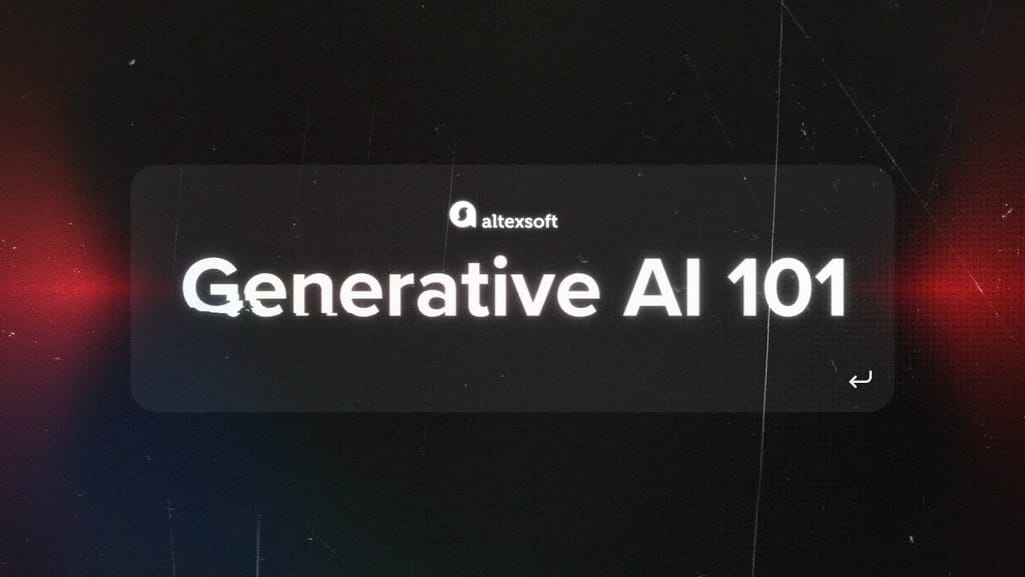

Reporting and performance tracking
Reputation management software can provide detailed reports on various performance metrics, such as average review scores, response rates, and the distribution of reviews across different platforms. This information is vital for assessing the effectiveness of your reputation management efforts.
Some tools also offer competitor analysis features, allowing hotels to benchmark their performance against competitors, look at their strengths and weaknesses, and identify areas for improvement.
Read about customer-related and other metrics worth tracking in our post about Hotel KPIs.
Automated feedback collection
When integrated with a property management system or a central reservation system, software solutions can collect guest information such as contact details, checkout dates, etc. Then they can automatically send guests post-stay surveys or feedback forms to guests, encouraging them to share their experiences.
By providing actionable insights, reputation management tools can help hoteliers prioritize operational, service, or facility improvements based on guest feedback, leading to better guest experiences and higher satisfaction rates.
Reputation management software providers
When comparing hotel management tools, it's important to first assess your business needs and then look at the strong sides of each platform. Besides the features we described above, it’s worth paying attention to such factors as
- customer support,
- customization options, and
- integration with other hotel management tools.
Here's a short comparison highlighting the main features and capabilities of some of the highly-rated reputation management solutions.
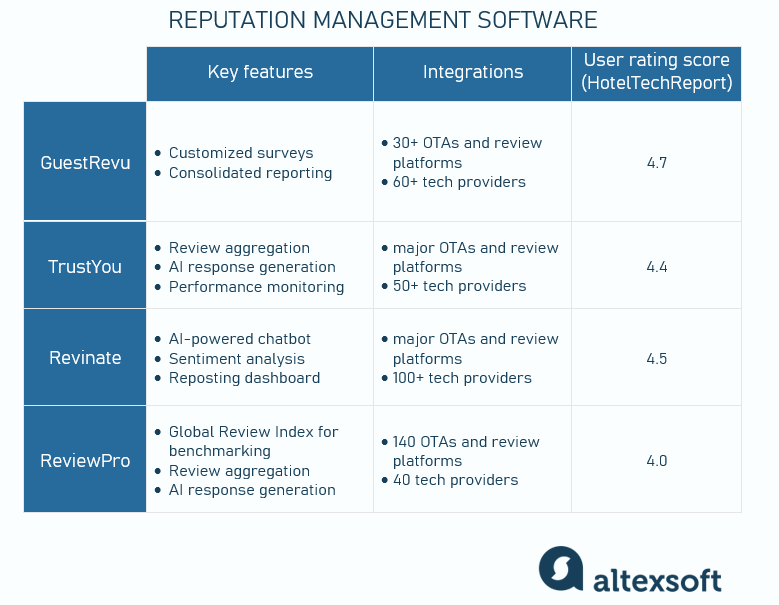
GuestRevu: direct guest feedback and simplified survey process
GuestRevu is a tool primarily for collecting direct feedback through automated guest surveys that travelers can fill out at any time (pre-, in-, or post-stay). The solution helps craft multi-language surveys with customized branding design available via live links, emails, in-house tablets, or QR codes.
GuestRevu also connects to 30+ major OTAs and review platforms and helps gather insights on guest satisfaction on one dashboard. Customizable alerts and sentiment analysis are also included.
With GuestRevu, hotels can access detailed reporting and define areas for improvement. It also offers a TripAdvisor review integration, which allows guests to leave you a review without logging in or even being a member.
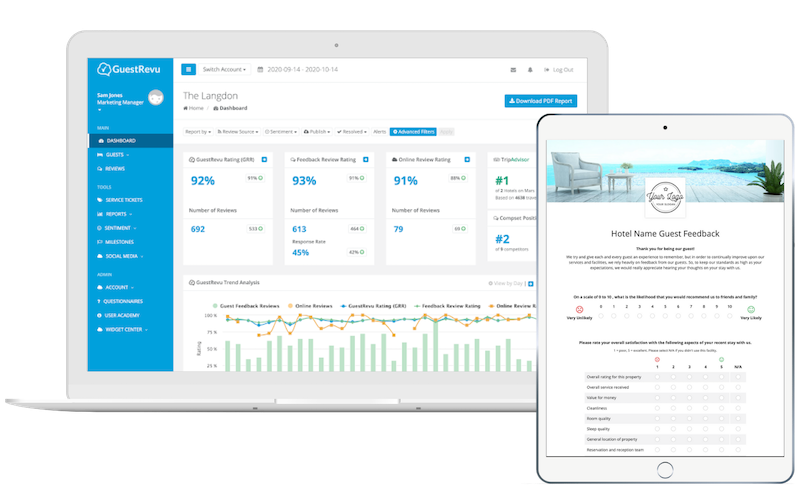
GuestRevu discloses its pricing information, offering 4 plans, one of which is free.
TrustYou: comprehensive view of a hotel's online reputation and support for marketing efforts
TrustYou boasts 100,000+ clients in over 100 countries, making it the most global vendor in our overview. It focuses on the entire guest journey, offering solutions for marketing, guest feedback, and reputation management. Its platform aggregates reviews from across the web, providing a comprehensive overview of a hotel’s online reputation.
TrustYou offers a Meta-Review summary that can be embedded on hotel websites and booking engines to boost conversions. It also provides tools for sending post-stay surveys and analyzing feedback to improve guest experiences.
The platforms TrustYou is integrated with are listed here.
Revinate: review management and personalized guest communication
With 12,000 hotels as clients, Revinate offers a suite of tools for various marketing purposes. One of its offerings is Revinate Guest Feedback that helps manage online rankings and collect guest feedback. It connects to the leading review platforms and allows managers to read and respond to reviews from a single interface.
Revinate solution also enables personalized communication, allowing hotels to send targeted emails based on guest history and preferences. It helps manage social media channels and perform sentiment analysis. There’s also a powerful analytics dashboard for tracking performance metrics and guest satisfaction trends, as well as benchmarking.
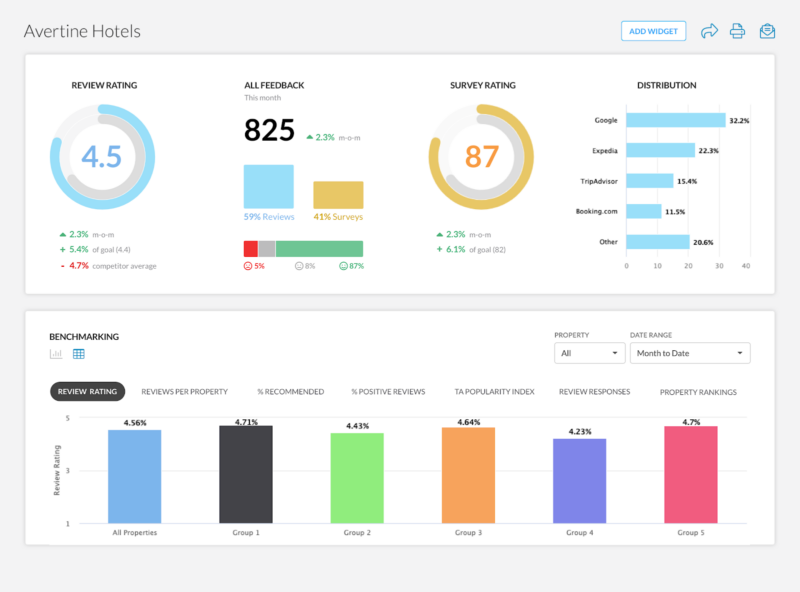
Revinate also integrates with many property management systems (PMS), making it easy to automate guest communication and feedback collection.
ReviewPro: competitive benchmarking and operational insights
ReviewPro is best known for its Global Review Index™, or GRI, which is based on aggregated review data from 140 online platforms. GRI serves as an industry-recognized score that hotels use to track reputation performance and benchmark against competitors.
Besides performance monitoring, ReviewPro offers a Guest Experience Improvement Suite™ that provides all the essential reputation management capabilities, such as
- sending customized feedback requests and surveys,
- managing responses from one platform,
- doing sentiment analysis,
- setting up customized review alerts,
- messaging automation, etc.
The platform can be customized to fit your workflows and organizational structure. As for integrations, ReviewPro comes preconnected with a number of hotel solutions.
How to choose and implement reputation management software
Needless to say, there’s no universal scenario because your actions will depend on the size, needs, and resources of your business. Here are some ideas of what you can do and which technologies you can implement as you scale.
Small property: focused tools to start automating
If you’re a small property like, say, a hostel or a family-run bed and breakfast, most of your workflows are probably manual as you have neither a massive turnover – nor a lot of channels to monitor for reviews.
To start automating your reputation management processes, consider choosing focused solutions to cover specific workflows. For example, you can start by setting up the aforementioned Google Alerts to get prompt notifications when someone mentions your brand online.
You can also check out such tools as Mention for social media listening or Respond.io to automate reply generation. The choice of solutions will depend on which workflow you want to streamline.
Mid-size business: multifunctional solution to meet diverse needs
If you’re a bigger property or maybe you run a group of hotels, it becomes too complicated to monitor and manage all of your reviews manually. That’s when it’s worth looking at one of the solutions we described above or similar alternatives. All of them cover the main reputation management workflows and will give you insights into your brand image performance.
Another option for you is choosing a CRM that has inbuilt reputation management capabilities. This way, you’ll be able to manage all your guest information and the entire range of customer relationships in a single system.
Check out our post about hotel CRM software to learn about some of the popular tools and their features.
Enterprise company: full-blown, AI-powered platform for comprehensive automation
If you are a multinational hotel chain, you need maximum automation and efficiency to handle your operations. In this case, consider building a custom platform – or gradually adding reputation management functionality to your proprietary system. This way, you can tailor it to your needs and workflows and build a seamless integration with all the required channels and software you already have in use. Enhancing it with AI capabilities will add precision to your response management, sentiment analysis, and other analytics processes.


In summary, reputation management is an ongoing process that requires a comprehensive strategy, which includes monitoring online platforms, engaging with guests, continuously improving service quality, and effectively managing crises. Successful reputation management not only mitigates the impact of negative experiences but also enhances guest loyalty, attracts new customers, and contributes to the overall success of your hospitality business.
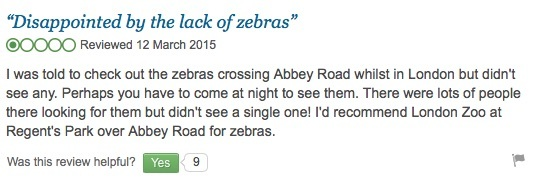
Working with reviews requires a lot of patience. A TripAdvisor review of Abbey Road Crossing made famous by the Beatles

Maria is a curious researcher, passionate about discovering how technologies change the world. She started her career in logistics but has dedicated the last five years to exploring travel tech, large travel businesses, and product management best practices.
Want to write an article for our blog? Read our requirements and guidelines to become a contributor.

